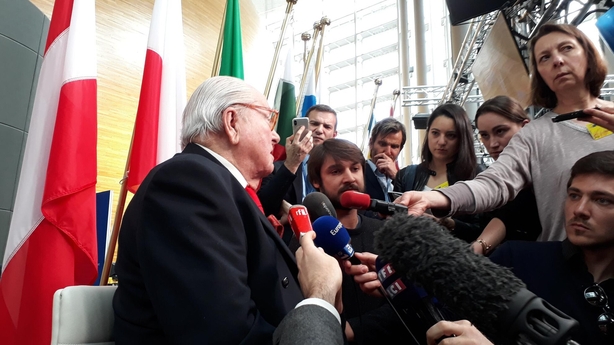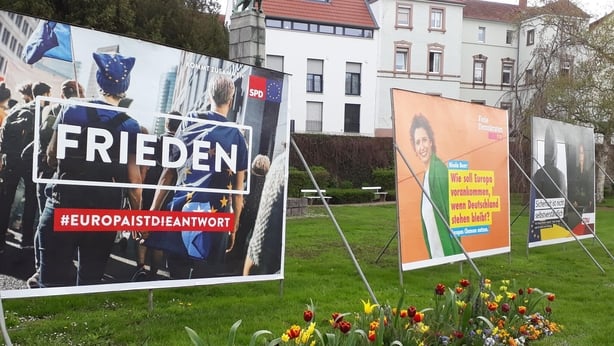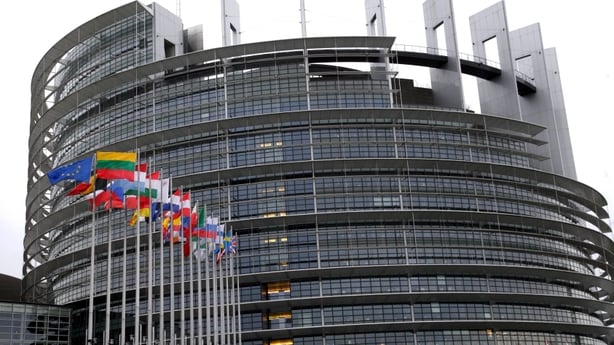The upcoming European Parliament elections are among the most significant in decades.
European solidarity is being tested by migration, climate change, and the future of the EU itself.
Anti-immigrant candidates and far-right parties are poised to make gains. So why are nationalist and populist politics growing across Europe and will they triumph?
You don't have to look far for evidence of Europe's migration crisis.
I've just arrived in the French city of Strasbourg when I'm shown an unmarked door beside the train station. It looks like the entrance to an old school, but it's an office where newly-arrived migrants seek accommodation.
And it's full of young families.
"We get 100 people a day," said office manager Michèle Boème, adding in the last two years most of those coming in are migrants who've been refused asylum in Italy or Germany.
Boème's office is hot and cramped. Two toddler boys eat sugar lumps from a bowl on a table while their parents plead for a bed. Boème tells them there are no beds tonight. They should come back tomorrow.
No bed either for a young Somali woman named Fatima who appears to have travelled alone to France. When I ask where she is sleeping, she answers, "in a cafeteria."
"Unfortunately, there is no solution," sighs Boème. "They stay in the waiting room of the hospital or the train station. Some rent cars to sleep in."
Even if beds are found, it's just for seven nights. Families must look again and again while they go through the months-long process of applying for asylum in France.
Migration and border security are key issues in this European election.
Polls suggest anti-immigrant and nationalist movements could jump from 10% of seats to 25% in the next parliament. Eurosceptic candidates on both the left and right could take a third of the 751 seats.
Inside the European Parliament, I meet Jean-Marie Le Pen, France's former National Front leader.
Le Pen has just retired as an MEP after decades of opposing the EU from within. But the 90-year-old far-right firebrand is still full of fire.

"This will be a contest between Macron and Marine Le Pen," he said, referring to his daughter.
Marine le Pen leads the reformed National Rally. She has ditched her father's plan to take France out of the EU but is demanding the return of sovereignty to member states.
Arnaud Stephan, communication advisor with far-right parties, predicts a massive success.
"All the problems regarding immigration, tension with Islamism, terrorism and globalisation were not taken care of by the majority of the European Parliament. We need to build a new relationship between the countries and the European authority," he said.
Resurgent nationalism, migration and dissatisfaction with the EU have delivered Eurosceptic majorities in Poland, Italy and Hungary.
These issues have also boosted groups in European Parliament demanding a new direction.
"We cannot support the evolution of the European union of the last few years," said MEP Gerolf Annemans, chairman of the Europe of Nations and Freedom group (ENF).
Annemans is a Flemish nationalist representing the Dutch-speaking part of Belgium. "The EU was never meant to be a united states of Europe," he says.
Annemans resents being called a populist. "They don't know what it is. They shout that the populists are going to destroy Europe. For God’s sake, we are going to save Europe!"
The far-right is booming in Italy too.
Deputy Prime Minister Matteo Salvini’s Northern League is poised to increase its MEP seats from six to 26.
This is down to Italy’s failing economy, migration and what Italian philosopher Michele Nicoletti describes as the return of fear.
"Fear and anxiety are stronger today than yesterday. Many citizens feel themselves in the hands of external entities and they want to have their life back," he said.
Nicoletti said Europe's declining population is adding to the anxiety.
"Our continent is facing a big demographic decline. Other countries such as China and India and are growing and our countries are going the opposite way. People are wondering what will happen in the future."

Fear is feeding the far-right in Germany too.
I take a train to Offenburg a town of 60,000 in rural western Germany where conservative parties such as the Christian Democratic Union have traditionally dominated. The anti-immigrant Alternative for Germany (AFD) is polling between 13 and 16%.
"We had a murder last year in Offenburg," said Andreas Richter of the Offenburger Tageblatt newspaper. "A doctor was killed by a migrant from Africa. There was a great uprising, people were angry."
While the AFD was originally opposed to the euro, the party's main issue is now migration.
"As a German I think we are all at a point that we say stop it now, we have enough people here," said a female student at the University of Applied Sciences in Offenburg. "I think a lot of people would say we should decide to close our borders."
Despite numerous phone calls and e-mails I don't manage to speak to anyone from the AFD. The party's election posters are absent from Offenburg's streets. I come across one small bit of anti-AFD graffiti but get the impression the movement is somewhat underground.
I do find migrants, checking in at an office for news of their asylum application.
"I'm still waiting and I hope to get it," says a young man from Nigeria. Another from Gambia has received negetive news. "I'm taking a lawyer," he said. Neither has experienced racism and say the German people are friendly."
Last year 200,000 migrants entered Germany, down from 750,000 in 2016. Most have either been sent home, granted asylum, or are still waiting.
Many who arrived in 2016 are still not working.
Claudia Trippel, of the University for Public Administration in the town of Kehl says this is mainly due to the language barrier. "It's a really difficult language to learn and if you work in Germany you have to speak German"
While integration has been largely successful, Trippel said a shortage of apartments in Germany means many of those granted asylum cannot find a home.
"If you are a person with family, many kids, don’t speak the language and probably don’t have work it’s not that easy to find apartments".
The biggest weakness for Europe's right wing is that it is not united. Far-right and right can have very different values and goals. If MEPs critical of Europe were to unite they could block commissioner appointments and budgets and frustrate attempts to enforce the rule of law in Poland and Hungary.

So will the far-right triumph in these the EU elections?
Long-time German MEP Elmer Brock (CDU) does not believe so.
"The Christian Democratic Union will be by far the strongest party in Germany. I think we can keep the AFD down and explain to the German people that nationalists are always against national interests," he said.
For Nicoletti, nationalism is not the answer to Europe’s problems, but an illusion.
"In the future no small country will be able to protect itself, develop economically or combat terrorism or the migrant crisis alone.
The alternative, Nicoletti said, is not between the European Union and national states but between EU and empires.
"That I think would be a regression."







